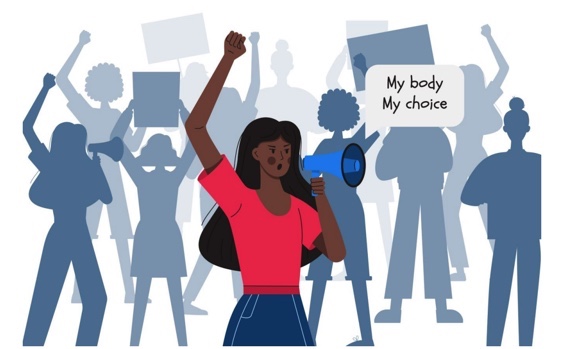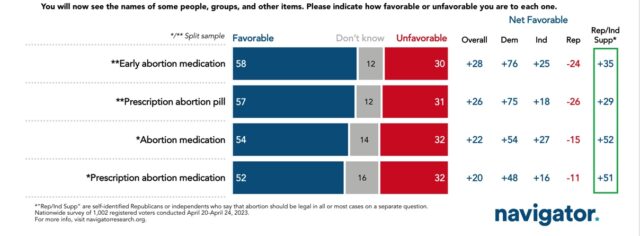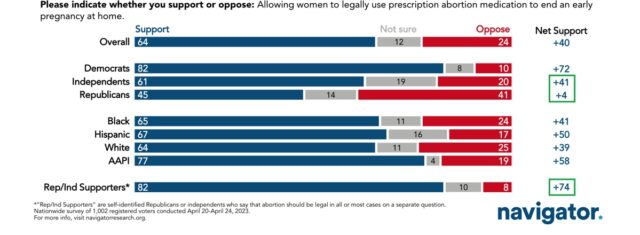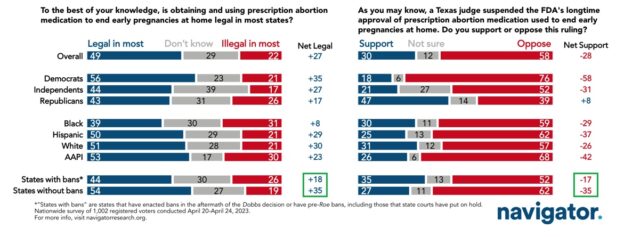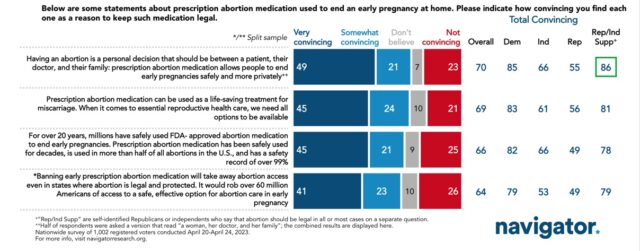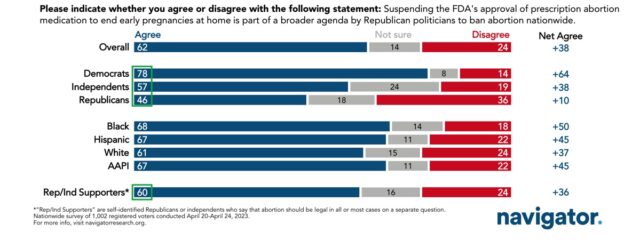- Majorities of Americans hold favorable views of abortion medication and oppose the Texas ruling that suspended the FDA’s authorization of it.
- More than three in five Americans say prescription abortion medication should remain legal and believe attacks on it are part of broader Republican agenda to ban abortion nationwide.
- The strongest arguments for keeping such medication legal focus on how it affects people’s personal lives – abortion is a personal decision between a patient and their doctor, this medication can be used as a treatment for miscarriage, and it has been used safely for over 20 years.
Most Americans View Abortion Medication in a Positive Light
There is relatively little difference in Americans’ attitudes toward “abortion medication” (net +22 favorable overall) and “early abortion medication” (net +28), though the latter is viewed slightly more favorably overall.
- “Rep/Ind supporters” (Republicans and independents who think abortion should be legal in all or most cases) view “abortion medication” (net +52 favorable) and “prescription abortion medication” (net +51) most favorably.
Nearly Two in Three Americans Say Prescription Abortion Medication Should Remain Legal
More than four in five Democrats (82%), three in five independents (61%), and nearly half of Republicans (45%) support “allowing women to legally use prescription abortion medication to end an early pregnancy at home.”
- More than four in five Republicans and independents who support legal abortion (82%) agree.
Americans Want the Suspension of Prescription Abortion Medication to Be Reversed
Even in states with abortion bans*, a majority of Americans oppose the Texas ruling that suspended the FDA’s approval of prescription abortion medication (net –17 support) and a plurality believe that such medication is legal in most states (net +18 legal); those in states without bans are even less likely to support the Texas ruling (net –35 support).
Most Convincing Arguments for Keeping Prescription Abortion Medication Legal Focus on How It Affects Americans’ Lives
Republicans and independents who support legal abortion say that the most convincing reason to keep such medication legal is that “having an abortion is a personal decision that should be between a patient, their doctor, and their family” (86% convincing).
Process Arguments About FDA Approval of Abortion Medication Are Less Convincing
Republicans and independents who support legal abortion say arguments about “[upending] the U.S. drug approval process” (58% convincing) and “[ignoring] the law and scientific research” (60%) are least convincing.
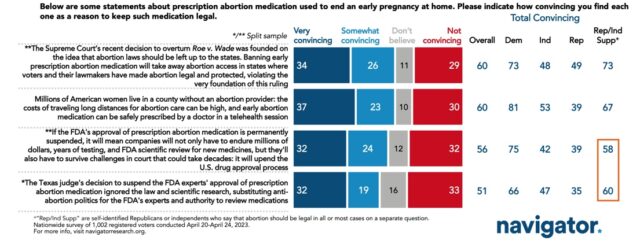 Three in Five Agree Attacks on Abortion Medication Are Part of a Broader Agenda to Ban Abortion Nationwide
Three in Five Agree Attacks on Abortion Medication Are Part of a Broader Agenda to Ban Abortion Nationwide
Majorities of Democrats (78% agree), independents (57%), and Republicans/independents who support legal abortion (60%) – along with a plurality of Republicans overall (46%) – agree that “suspending the FDA’s approval of prescription abortion medication” is “part of a broader agenda by Republican politicians to ban abortion nationwide.”
Clarence Thomas’ Favorability Continues to Decline in the Wake of Reports About His Failure to Disclose Financial Dealings
Justice Thomas’ favorability has declined substantially in the last year: from net +7 favorable among Americans overall last April, to net –12 in early July after the Dobbs decision, to net –17 today.
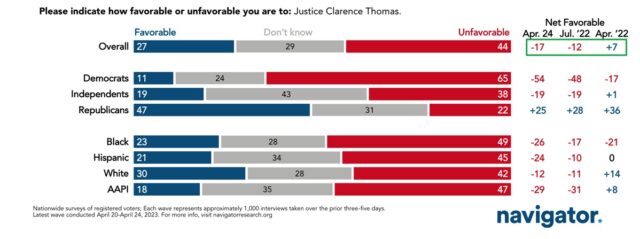
Americans Support Impeaching Clarence Thomas, Especially After the Facts Are Laid Out
Providing details about the “undisclosed luxury trips… other expensive gifts… [and failure] to report nearly $700,000 in income that his wife earned from a conservative think tank” increase support for impeaching Justice Thomas from net +7 to net +34 among Americans overall.
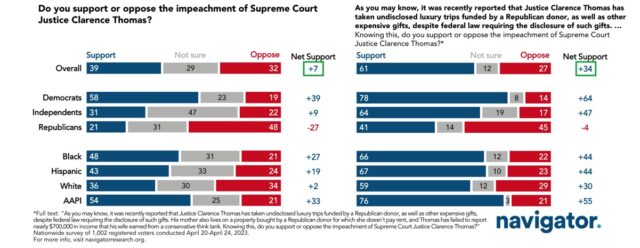
About The Study
Global Strategy Group conducted public opinion surveys among a sample of 1,002 registered voters from April
20-April 24, 2023. 102 additional interviews were conducted among Hispanic voters. 79 additional interviews
were conducted among Asian American and Pacific Islander voters. 105 additional interviews were conducted
among African American voters. 98 additional interviews were conducted among independent voters. The
survey was conducted online, recruiting respondents from an opt-in online panel vendor. Respondents were
verified against a voter file and special care was taken to ensure the demographic composition of our sample
matched that of the national registered voter population across a variety of demographic variables.
